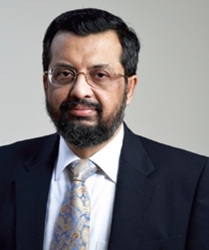
DR ARUP DUTTA
Nephrologist
Introduction
Dr. Arup Ratan Dutta is one of the best Nephrologist in Anandapur, Kolkata with an experience of 28 years in this field. Dr. Arup Ratan Dutta is a renowned physician in the field of Nephrology, Dialysis and Transplantation. Dr. Arup Ratan Dutta has 28 years of experience and is currently the Chief Nephrologist at Fortis Hospitals, Kolkata. Dr. Dutta has been an instrumental person in bringing and practicing new technology like Chronic Peritoneal Dialysis, CRRT and Plasmapheresis in the region. Quality of dialysis has been his focus and he is credited to be having many patients on long term (10 – 12 years) dialysis.
Hospital Associations
Fortis Hospital, Anandapur, Kolkata
Services/Interest
- Hypertension
- Kidney diseases
- Kidney transplantation
- Chronic Peritoneal Dialysis
Awards and Recognitions
Dr. Datta was the recipient of ‘Young Asia Investigator’ award at the International Society for Peritoneal dialysis conference at Seoul, Korea in 1998. Dr. Arup Ratan Datta also did a visiting fellowship in Toronto Hospitals, Canada.
Education
After completing MBBS he joined the Post Graduate Institute of Medical Education and Research, Chandigarh from where Dr. Arup Ratan Datta obtained MD(Medicine) and DM (Nephrology) degrees in 1986 and 1989 respectively.
I Speak
English
Feedback For Dr Arup Dutta
Write FeedbackWho is a nephrologist?
Nephrology is the medical specialty which is concerned with the treatment of kidney conditions and abnormalities, and a physician who practices this specialty of nephrology is called a nephrologist. Nephrology being the subspecialty of internal medicine, a nephrologist needs to complete the same training as an internist and then gain an additional fellowship in nephrology. Nephrologists are responsible for diagnosing causes and levels of kidney failure and prescribing appropriate treatment such as medication, diet changes, or dialysis.
When should I see a nephrologist?
Nephrologists are physicians who deal with diagnosis and treatment of diseases of the kidneys.
You should see a nephrologist when you start experiencing pain around your abdomen that usually radiates to your sides and lower back. Or when you suffer from a reduced amount of urine, swelling of your legs, ankles, and feet, unexplained shortness of breath, excessive drowsiness or fatigue, persistent nausea, confusion, pain, or from pressure in your chest.
What diseases does a nephrologist treat?
Nephrologists can treat the following conditions:
- Blood or protein in the urine
- Chronic kidney disease
- Renal artery stenosis
- Nephrotic syndrome
- Polycystic kidney disease
- Hemolytic uremic syndrome
- Kidney stones, although a urologist may also treat this
- KKidney infections
- kidney swelling due to glomerulonephritis or interstitial nephritis
- Kidney cancer
- End-stage kidney disease
- Kidney failure, both acute and chronic
What kind of tests do nephrologists perform?
Nephrologists treat the diseases of the kidneys. But before they can treat them, the nephrologists need to diagnose them, and they do that by performing several tests. They are as follows:
- Physical examination
Since our kidneys are responsible for maintaining fluid balance and filtering out the excess fluids and waste from the blood, damage to the kidneys leads to fluid accumulation and overload which causes edema or swelling of the legs and face, and long term kidney diseases also lead to symptoms of high blood pressure and anemia. So, a physical examination is carried out by the doctor to diagnose edema or high blood pressure.
- Blood tests
Blood tests are performed to reveal altered levels of urea, creatinine, and electrolytes including sodium, magnesium, potassium, calcium, phosphates, nitrogen etc.
A nephrologist may also perform a blood test for various organisms that may damage the kidneys including hepatitis C, hepatitis B, AIDS etc.
- Urine analysis
Nephrologists also perform urine analysis that may help them diagnose kidney damage by revealing excess proteins that are being excreted from the body in the urine. They also use microscopic analysis of urine to detect kidney and urinary tract infection.
- Imaging Studies.
They can also put imaging studies like Ultrasound scan, CT Scan, or MR angiography to work to detect kidney diseases.
Other tests performed by the nephrologists are Renal Biopsy, Intravenous Urography (IVU), Scintigraphy, and Renal Arteriography.
What happens in your first nephrologist's appointment?
Usually, before your appointment, you are asked to bring information on:
- A list of symptoms you are facing and how long you have been facing them.
- A list of all of your current doctors with their contact information.
- A list of medications you are taking or were asked to take.
- Your medical history.
- Family History.
- A surgery list, if any.
During their first visit, the patients usually go through:
- A history of your current problem.
- Complete physical examination.
- Comprehensive evaluation.
- Previous treatments and complications.
In some cases, additional tests are also performed:
- Urinalysis
- Imaging studies.
- Blood testing
One done with your first round of visit, your nephrologist will suggest a diagnosis, treatment plan, and follow-up visits.
What's the difference between a nephrologist and urologist?
When it comes to the difference between nephrology and urology, the former deals with only kidneys while the latter provides treatment for a condition relating to the bladder, urethra, ureters, kidneys, and adrenal glands. Urologists also cover male issues relating to the prostate and penis.
Can a nephrologist perform surgery like a kidney transplant?
The nephrologists do not perform surgery. The surgeries like a kidney transplant are performed by transplant surgeons.
